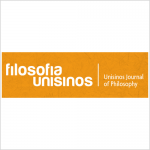A Dilemma for Naturalistic Theories of Intentionality
Vol. 22. N.1 (2021): Jan-Apr • Filosofia Unisinos - Unisinos Journal of Philosophy
Autor: Michael J. Hegarty
Resumo:
Eu argumento que surge um dilema para os filósofos naturalistas da mente na tradição semântica naturalizada e, assim, dar uma explicação naturalista da mente é uma questão urgente. A Tese de Brentano - de que um estado é mental se, e somente se, esse estado tem conteúdo representacional não derivado - fornece uma rota atraente para naturalizar o mental. Se for verdadeira, a Tese de Brentano significa que naturalizar a representação é suficiente para naturalizar o mental. Mas um naturalista que aceita a Tese de Brentano compromete-se, portanto, com um eliminativismo sobre a categoria do mental. Isso ocor- re porque as teorias naturalistas da representação são redutivas e, portanto, generalizam excessivamente, aplicando-se a estados patentemente não mentais. De acordo com essas teorias, argumentou-se, fenômenos como anéis de árvores e saliva contam como repre- sentacionais. Somente a proposta de outras condições naturalistas sobre a representação poderia evitar a conclusão eliminativista. Mas isso mostra que os naturalistas fizeram apenas um progresso limitado no sentido de naturalizar o mental. E se um naturalista rejeita a tese de Brentano, então ele abandona uma ligação clara entre representação e mentalidade. Consequentemente, cabe ao naturalista propor uma outra marca do mental, naturalisticamente aceitável. Isso, mais uma vez, mostra que os naturalistas fizeram apenas um progresso limitado na questão da naturalização do mental.
Abstract:
I argue that a dilemma arises for naturalistic philosophers of mind in the naturalised seman- tics tradition. Giving a naturalistic account of the mind is a pressing problem. Brentano’s Thesis — that a state is mental if, and only if, that state has underived representational content — provides an attractive route to naturalising the mental. If true, Brentano’s Thesis means that naturalising representation is sufficient for naturalising the mental. But a natu- ralist who accepts Brentano’s Thesis thus commits to an eliminativism about the category of the mental. This is because naturalistic theories of representation are reductive, and so over-generalise by applying to patently non-mental states. According to these theories, it has been argued, phenomena like tree rings and saliva come out as representational. Only proposing further Naturalistic conditions on representation could avoid the eliminativist conclusion. But this shows that Naturalists have made only limited progress towards nat- uralising the mental. And if a Naturalist rejects Brentano’s Thesis, then she gives up on a clear link between representation and mentality. Hence, it is incumbent on the Naturalist to propose another, naturalistically acceptable, mark of the mental. This, again, shows that Naturalists have made only limited progress on the issue of naturalising the mental.
ISSN: 1984-8234
DOI: 10.4013/fsu.2021.221.07
Texto Completo: http://revistas.unisinos.br/index.php/filosofia/article/view/fsu.2021.221.07/60748404
Palavras-Chave: Intencionalidade, representação, fisicalismo, eliminativismo, Brentano, materialismo, naturalismo.

Filosofia Unisinos - Unisinos Journal of Philosophy
The journal Filosofia Unisinos - Unisinos Journal of Philosophy is published once every four months by Universidade do Vale do Rio dos Sinos.
Articles must be original, unpublished, and not under consideration for publication anywhere else and can be written in Portuguese, English or Spanish
Filosofia Unisinos - Unisinos Journal of Philosophy prints articles, translations and critical book reviews. It also reprints papers that are considered fundamental to the area when authorized written permission is given by the original publisher.
